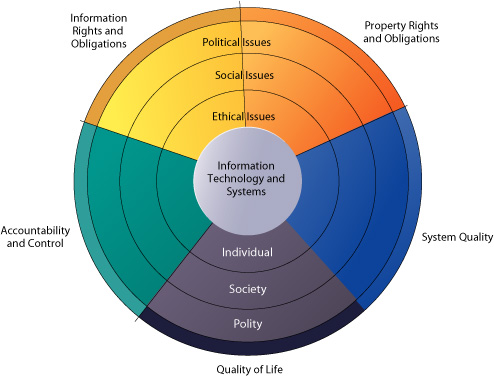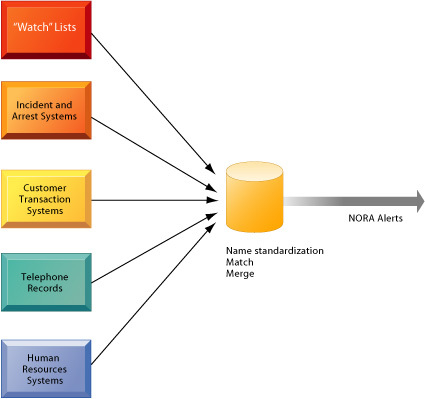| Section 5.1: Bullet Text |
Chapter
Contents | View
Full Text |View Bullet Text
|
Understanding Ethical and Social Issues Related to Systems
Ethics are the principles of right and wrong that can be used by individuals acting as free moral agents to make choices to guide their behavior. Ethical, social, and political issues are closely linked. Introduction of new technology has a ripple effect in the current equilibrium, creating new ethical, social, and political issues that must be dealt with on individual, social, and political levels. Both social and political institutions require time before developing new behaviors, rules, and laws. [Figure 5-1]
 |
| FIGURE 5-1 The relationship between ethical, social, and political issues in an information society The introduction of new information technology has a ripple effect, raising new ethical, social, and political issues that must be dealt with on the individual, social, and political levels. These issues have five moral dimensions: information rights and obligations, property rights and obligations, system quality, quality of life, and accountability and control. |
There are five main moral dimensions that tie together ethical, social, and political issues in an information society. These moral dimensions are information rights and obligations, property rights and obligations, accountability and control, system quality, and quality of life.
Four key technology trends have heightened the stress on existing social arrangements and laws.
Computing power has doubled every 18 months allowing growing numbers of organizations to use information systems in their core business processes. This growing dependence on critical systems increases vulnerability to system errors and poor data quality.
Advances in data storage techniques have enabled for the multiplying of databases on individuals maintained by private and public organizations, making the violation of individual privacy both cheap and effective.
Advances in data analysis techniques enable companies and government agencies to use profiling to determine detailed information about individual’s habits and tastes and create dossiers of detailed information. Nonobvious relationship awareness (NORA) is a new data analysis technology that can take data about people from many sources and correlate relationships to find hidden connections to identify potential criminals and terrorists. [Figure 5-2]
 |
| FIGURE 5-2: Nonobvious Relationship
Awareness (NORA) NORA technology can take information about people from disparate sources and find obscure, nonobvious relationships. It might discover, for example, that an applicant for a job at a casino shares a telephone number with a known criminal and issue an alert to the hiring manager. |
Advances in networking reduce the costs of moving and accessing data, permitting privacy invasions on a vast scale.